Costa Rica Residency Renewal Fees Explained
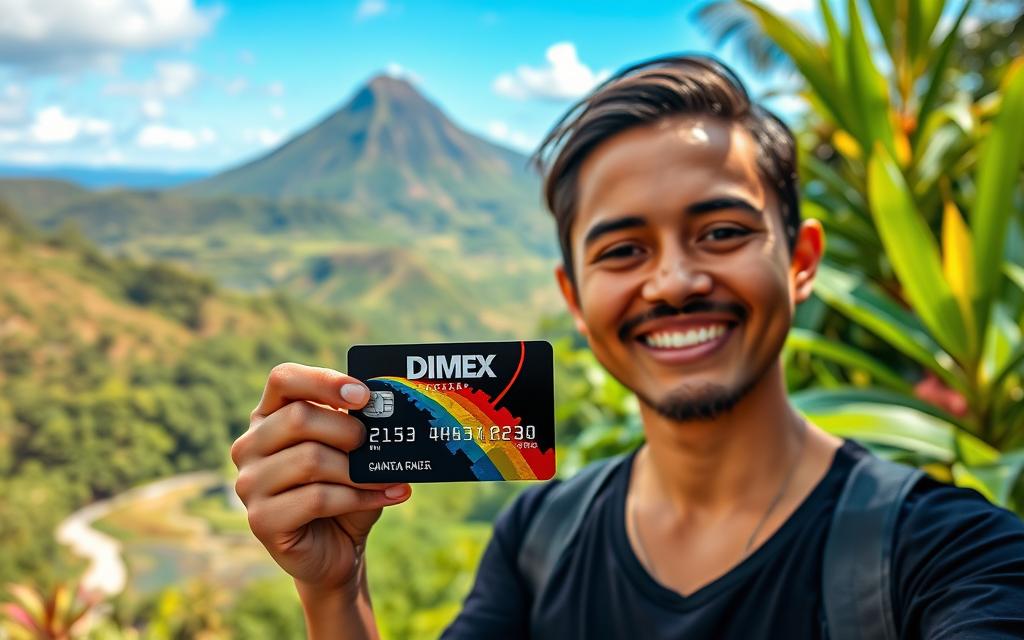
Renewing your Costa Rica residency is a significant step in maintaining your legal status in this beautiful Central American country. Costa Rica has emerged as an attractive option for individuals and families seeking an improvement in their quality of life and those who wish to explore new opportunities in a diverse and welcoming environment.
Understanding the Renewal Process
The DIMEX card, sometimes referred to as a cedula, is a crucial document for residents in Costa Rica. Once you've gone through the initial residency process and received your DIMEX card, you're relieved to have completed that significant step. However, it's essential to remember that these cards are only valid for a certain amount of time and need to be renewed.
Understanding the renewal timeline is crucial as DIMEX cards are only valid for specific periods, typically 2-3 years, requiring timely renewal to maintain legal residency status in Costa Rica. The renewal process, while less complicated than the initial application, still requires attention to detail and adherence to specific requirements.
We'll provide a comprehensive overview of the Costa Rica residency renewal process, focusing on the fees involved and what residents can expect. This guide will walk you through all aspects of the renewal process, from understanding when to begin to what documents you'll need and where to complete your renewal.
Knowing the exact costs involved helps residents avoid unexpected expenses and ensures a smooth renewal experience. We'll break down the various fees associated with different types of residency renewals, helping you budget appropriately for this necessary process.
Understanding Costa Rica Residency Types
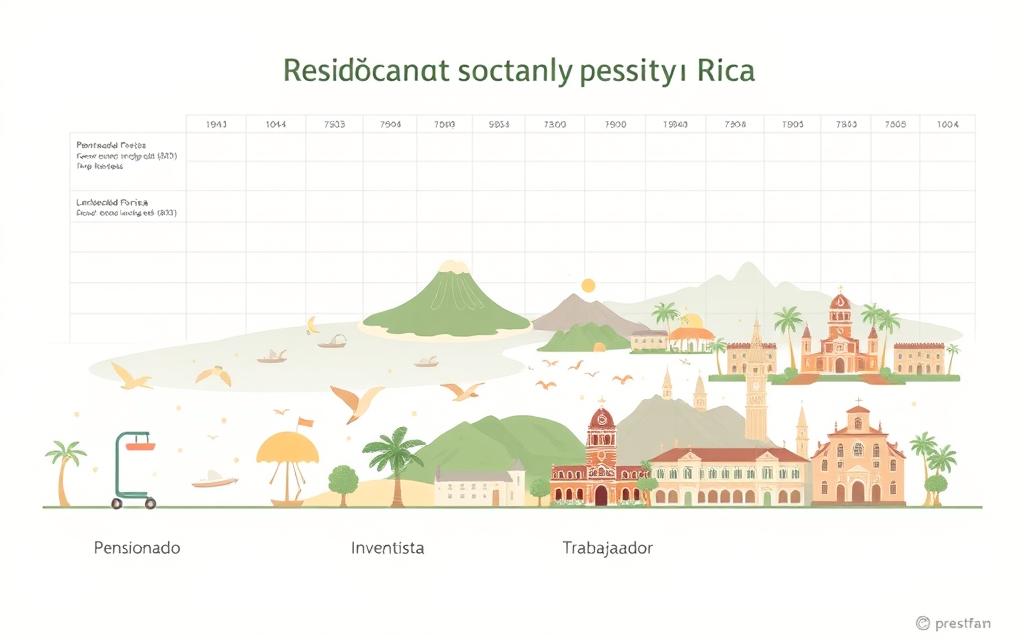
Costa Rica's residency program is multifaceted, offering different categories to suit various applicant profiles. The country provides a variety of residency options to suit the needs and circumstances of applicants. Among the most common options are rentista residency, designed for those with stable and sufficient income, and investment residency, for those who wish to contribute to the country's development through business investment.
Temporary Residency Categories
Temporary residency in Costa Rica is typically granted for specific categories, including rentista and investment residency. We applied for permanent residency through the birth of our first child and initially received DIMEX cards valid for two years. Temporary residents can transition to permanent residency status after maintaining their temporary status for a specific period, typically three years.
Family connections also provide a pathway to residency, such as through marriage to a Costa Rican citizen or having a Costa Rican child. The renewal process and required documentation can vary based on the category of temporary residency.
Permanent Residency Options
Permanent residency offers greater stability, with longer validity periods for DIMEX cards, usually three years between renewals. This status is available to those who have held temporary residency for the required period or have specific family ties to Costa Rica. Permanent residents enjoy additional benefits, including the ability to work legally without special permits.
The renewal process for permanent residency is generally simpler, with less stringent proof of income requirements. To maintain permanent residency status, individuals must adhere to specific documentation requirements during renewals, which differ from those for temporary residency.
When to Renew Your Costa Rica Residency

Understanding when to renew your Costa Rica residency is crucial for maintaining your resident status. Renewal is a critical process that affects various aspects of life in Costa Rica, from banking and contracts to accessing resident discounts.
Optimal Renewal Timeframe
It's recommended to start the renewal process at least 60 days before your current DIMEX card expires. This timeframe allows for any unexpected delays or additional requirements that may arise during the renewal process.
Consequences of Late Renewal
Late renewal can lead to significant complications. Without a valid DIMEX card, residents may face restrictions on banking services, including limitations on transfers and new account openings. Additionally, late renewal can result in higher non-resident prices at national parks and other attractions.
Allowing your Costa Rica residency to lapse can have far-reaching consequences beyond administrative issues. For instance, without a valid DIMEX card, you won't be able to open new accounts, sign contracts, or obtain cell phone plans. Banks and other institutions may not accept your cedula as a form of identification, making it difficult to conduct financial transactions or apply for services.
The financial implications are also significant, as you'll have to pay higher non-resident prices at places like national parks. For renewals more than three months late, you'll need to obtain a lawyer's letter explaining the delay, adding cost and complexity. In extreme cases, additional documentation like a new criminal background check may be required.
Fees for Renewing Costa Rica Residency

Understanding the costs associated with renewing your Costa Rica residency is crucial for a smooth renewal process. The fees involved can be broadly categorized into government fees, administrative charges, and other service costs.
Government Fee Breakdown
The government fees for renewing your Costa Rica residency are typically paid directly to a specific Banco de Costa Rica (BCR) account. These fees are usually quoted in USD but are paid in colones based on the exchange rate at the time of payment. It's essential to check the current fee schedule to ensure you're prepared for the costs involved. For the most up-to-date information on whether residency in Costa Rica is worth the investment, you can visit this resource.
Administrative and Service Charges
In addition to government fees, there are administrative and service charges associated with the renewal process. These fees cover the costs of processing your application and are typically paid at the time of your appointment. The amount can vary depending on the specific services required for your renewal. Cash is universally accepted for these payments, and some locations may also accept BCR debit cards.
Payment Methods and Options
When it comes to paying for your Costa Rica residency renewal, the payment options are more limited than you might expect. Government fees must be paid directly to a BCR account, either through a cash deposit or a transfer from your own BCR account. For administrative fees, cash is the preferred method, although some locations may accept BCR debit cards. It's crucial to note that credit cards are generally not accepted for any part of the residency renewal payment process. Having exact change for cash payments is also recommended, as some locations may have limited ability to provide change for large bills.
Being aware of these payment options and having the necessary funds available in the correct currency can help ensure a smooth renewal process.
Required Documents for Residency Renewal
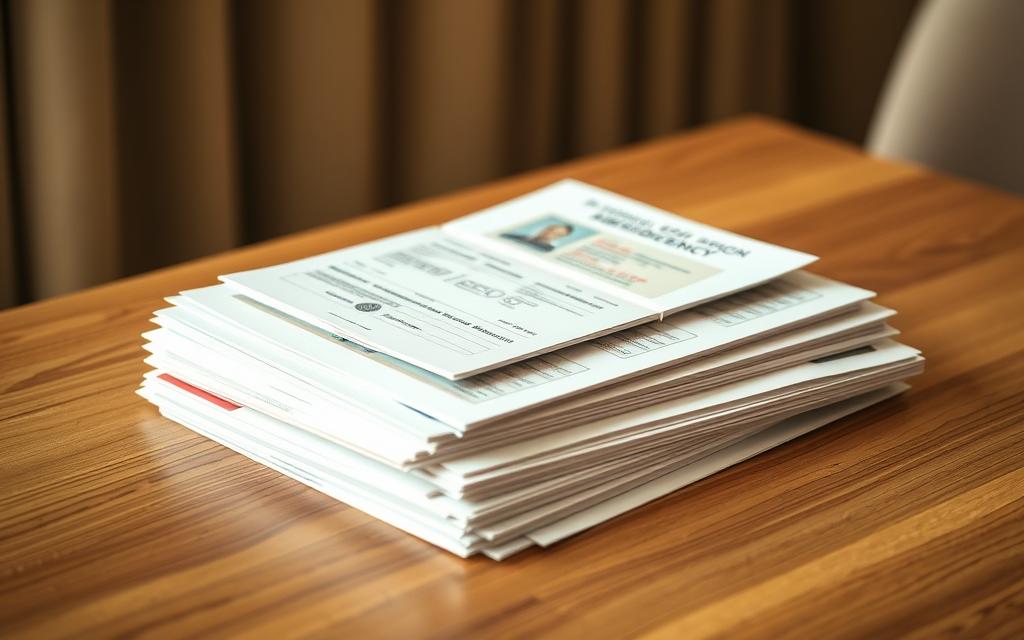
Renewing your Costa Rica residency requires gathering specific documents, a crucial step in the renewal process. The documentation needed can vary based on your residency category, making it essential to understand the requirements for your particular status.
Essential Documentation Checklist
When renewing your residency, you'll need to provide a standard set of documents. This typically includes a valid passport, a completed application form, and proof of income. For instance, pensionado residents must show proof of their pension, while rentista residents need to demonstrate their stable income through bank statements. It's also crucial to ensure that your Caja (CCSS) enrollment is up to date, as proof of this is often required.
For those insured under a spouse's account, verifying dependent status can sometimes be challenging. You may need to renew your dependent status at your local CCSS office periodically, and in some cases, provide an apostilled marriage certificate to prove your continued eligibility.
Category-Specific Requirements
Different residency categories in Costa Rica have unique documentation requirements. For example, inversionista residents must provide documentation proving they still own the qualifying investment assets in Costa Rica. Those with residency through marriage (Vinculo) may need to provide a recent marriage certificate from the Costa Rican Civil Registry.
Understanding these category-specific requirements is vital to avoid delays in the renewal process. By ensuring you have all necessary documents, you can facilitate a smoother renewal experience.
Where to Renew Your DIMEX Card
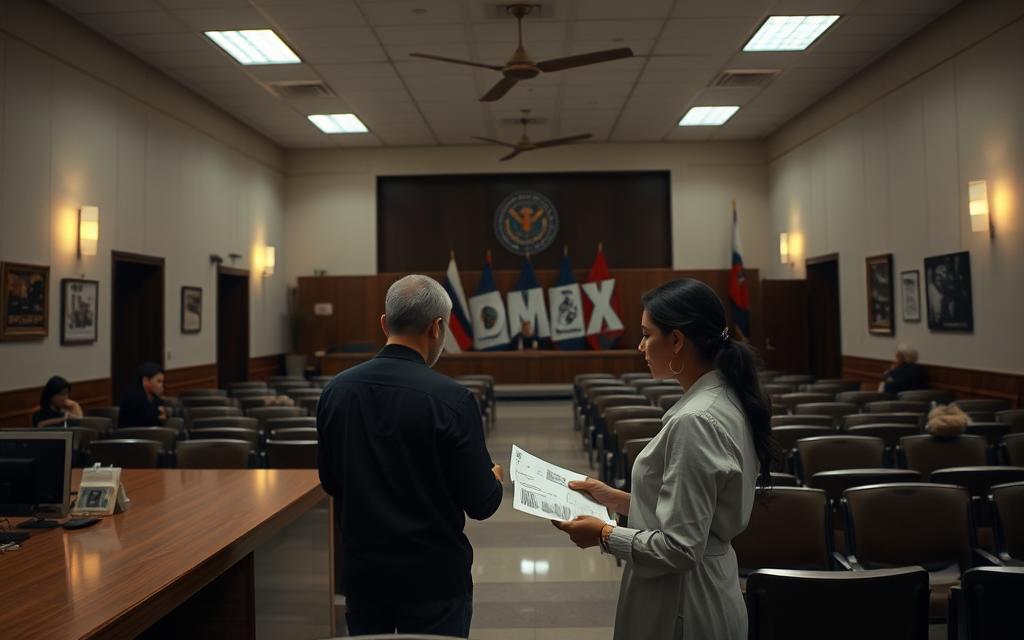
When it's time to renew your DIMEX card, Costa Rica offers multiple venues to complete the process. The DIMEX card is essential for residents, serving as proof of their residency status. Renewing it involves choosing the right location and following the specific procedures for that location.
Banco de Costa Rica (BCR) Renewal Process
The Banco de Costa Rica (BCR) is a primary location for renewing your DIMEX card. The BCR renewal process is known for its efficiency and streamlined service. To renew at a BCR branch, you first need to schedule an appointment through their official website or by contacting their customer service. On the day of your appointment, ensure you have all required documents, including your current DIMEX card, proof of address, and any other category-specific documents.
During your appointment, the BCR staff will process your application, and you will need to pay the applicable renewal fees. The BCR charges a service fee for this process, which is in addition to the government renewal fees.
Correos de Costa Rica (Post Office) Option
For those who prefer or need an alternative, Correos de Costa Rica, the national postal service, offers DIMEX renewal services at select locations. The post office renewal process requires an advance appointment and generally follows a similar procedure to the BCR option, with some differences. You must pay the government fees in advance at a BCR branch and bring the receipt to your post office appointment.
The post office charges its own service fee, approximately 7,910 colones, paid directly at your appointment. After processing, your application is sent to immigration authorities, and your new DIMEX card will be delivered to your chosen post office location.
Making Your Renewal Appointment
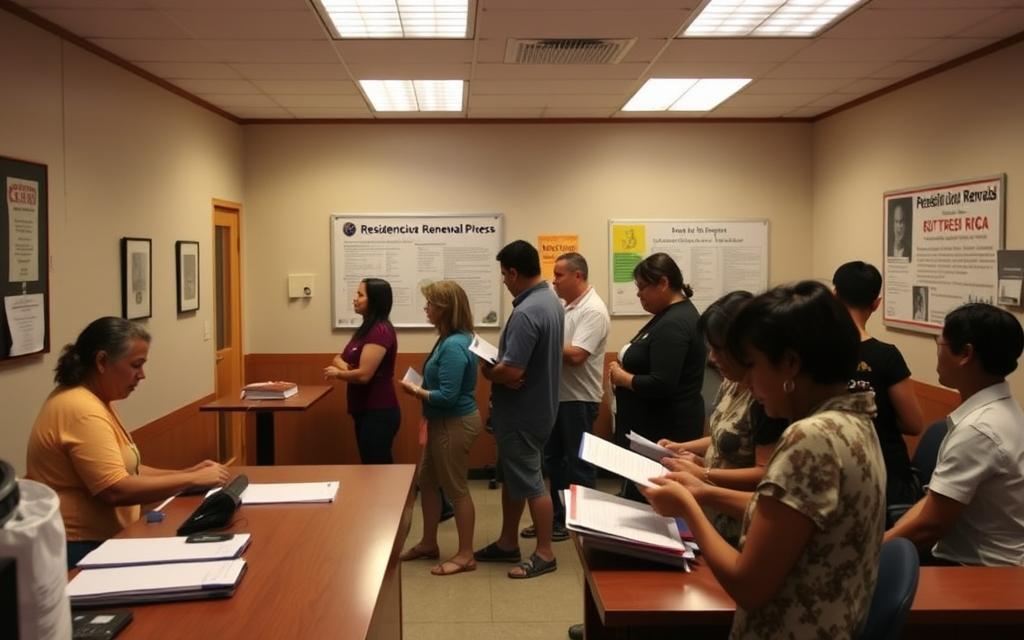
Renewing your DIMEX card requires making an appointment, which can be done in two convenient ways. The process is straightforward, and we're here to guide you through it.
Online Appointment Booking
For those who prefer the convenience of digital services, online appointment booking is available. This method allows you to schedule your appointment from anywhere, at any time, as long as you have a stable internet connection. Before you start, ensure you have all the necessary information readily available, such as your DIMEX number and personal details. The online system is user-friendly, and you can select your preferred date and time based on the availability at your chosen Banco de Costa Rica (BCR) branch.
To make the most of this service, we recommend familiarizing yourself with the BCR's renewal process beforehand. This will help you understand the requirements and make your online booking experience smoother.
Phone Reservation Process
If you prefer a more personal touch or encounter difficulties with the online system, you can make your appointment by phone. To do this, you'll need to call the BCR appointment line at 800-BCRCITA (227-2482). This is a toll-free number that can be accessed using a local Costa Rica phone number. Be prepared to provide your name, email, DIMEX/cedula number, expiration date, and your preferred BCR branch.
Most calls are conducted in Spanish, although English-speaking representatives are occasionally available. Once you've provided the necessary information, the representative will offer you available dates and times for your appointment. You'll receive a confirmation number, which you should note down, in addition to the email confirmation you'll receive.
Step-by-Step Renewal Process at BCR
Navigating the residency renewal process at Banco de Costa Rica (BCR) can be simplified by breaking it down into manageable steps. The renewal process is a critical aspect of maintaining your legal status in Costa Rica.
Before Your Appointment
Before heading to BCR for your renewal appointment, ensure you have all the necessary documents ready. This includes your expired or soon-to-expire DIMEX card, proof of income, and any other category-specific requirements. It's also advisable to confirm your appointment details and understand the payment process for the renewal fees.
Preparing all required documents in advance will streamline the process and minimize potential delays.
During Your Appointment
During your appointment at BCR, you'll submit your application along with the required documents and pay the renewal fees. The staff will guide you through the process, which includes verifying your information and capturing your biometric data. After completing the formalities, you'll receive a "Comprobante de Solicitud" document, which serves as temporary proof of your legal status while you wait for your new DIMEX card.
This document is crucial, especially if your previous DIMEX card has expired, as it can be presented to officials if needed.
After Your Appointment
After your appointment, the processing of your new DIMEX card will begin. You can expect to wait for your new card to be produced and delivered to your designated pickup location at Correos de Costa Rica. The official processing time is 22 business days, but delays of 1-3 months are not uncommon.
In the meantime, you may receive a digital copy of your new DIMEX by email, which can serve as temporary proof of your status. It's advisable to keep the "Comprobante de Solicitud" document with you at all times, along with a digital copy of your DIMEX if received, to avoid any issues during this waiting period.
Proof of Caja (CCSS) Enrollment
To successfully renew your residency in Costa Rica, you'll need to provide proof of Caja (CCSS) enrollment. This step is crucial as it verifies your health insurance coverage, which is a mandatory requirement for maintaining your residency status.
Verifying Your Caja Status
Verifying your Caja status is the first step in the renewal process. For those insured under their spouse, there can be issues with proving coverage due to the need to renew dependent status at the local CCSS office every couple of years.
To avoid delays, it's essential to check your Caja status well in advance. You can do this by visiting your local CCSS office or checking online if available. Ensuring your status is up-to-date will prevent any last-minute complications during the residency renewal process.
Resolving Caja Issues Before Renewal
If you discover issues with your Caja status, addressing them promptly is crucial before attempting your residency renewal in Costa Rica. Common problems include missed payments, system registration errors, or expired dependent status for those covered under a spouse's account.
To resolve these issues, you may need to visit your local CCSS office with appropriate documentation, such as proof of payments made or an apostilled marriage certificate for dependents. For more information on the next steps after resolving Caja issues, you can visit this resource for additional guidance.
By verifying your Caja status and resolving any issues early, you can ensure a smooth residency renewal process.
Special Considerations for Different Residency Categories
Understanding the specific requirements for your residency category is crucial for a smooth renewal process in Costa Rica. Different categories have unique documentation and eligibility criteria that must be met to avoid any complications or delays.
Pensionado and Rentista Requirements
Pensionado and Rentista categories require proof of a stable income from a pension or rental income, respectively. To renew, you'll need to provide documentation showing that your income meets or exceeds the minimum threshold set by Costa Rica's immigration authorities. Typically, this involves submitting bank statements or pension documents that demonstrate your financial stability.
For Pensionados, the income requirement is often linked to the minimum pension amount set by Costa Rica. Rentistas, on the other hand, must show income from rental properties or other investments. Ensuring your documents are up to date and reflect the required income level is essential for a successful renewal.
Inversionista Documentation
Inversionistas, or investors, must provide documentation proving their investment in Costa Rica. This can include property deeds, business registration documents, or investment certificates. The key is to demonstrate that the investment is legitimate and contributes to the Costa Rican economy.
When renewing, Inversionistas should be prepared to show that their investment remains active and compliant with the initial investment requirements. This may involve updating your documentation to reflect any changes in your investment status.
Vinculo (Marriage) Renewal Process
For those with residency through marriage (Vinculo), renewing involves specific requirements to prove the relationship remains valid. A recent marriage certificate from the Costa Rican Civil Registry, not more than two months old, is typically required. Some locations may also necessitate an in-person interview or an affidavit to verify the authenticity of the marriage.
Vinculo residents have the flexibility to renew at either immigration offices or participating BCR branches. After two years, they become eligible for permanent residency or citizenship. The renewal process is generally simpler, requiring fewer financial documents, but proof of the Costa Rican spouse's current Caja status is essential.
Picking Up Your New DIMEX Card
The final step in renewing your Costa Rica residency is collecting your new DIMEX card. After completing the renewal process, your new card will be mailed to the post office you specified during your renewal appointment.
When your DIMEX card is ready for pickup, you'll receive notification that it's available at the post office. It's essential to collect your card within the specified timeframe.
Expected Timeframes
You have 30 days from the card's arrival to collect it from the post office. If you fail to pick up your card within this timeframe, it may be returned to immigration authorities. The processing time for your DIMEX card can vary, but generally, it takes a few weeks after your renewal appointment.
Required Documentation for Pickup
When collecting your new DIMEX card, you must bring specific documentation to verify your identity. The essential documents for pickup include your application receipt (Comprobante de Solicitud) and your expired DIMEX card or passport for identification. Only the cardholder can pick up their DIMEX card; this cannot be delegated to another person, even with authorization.
During pickup, the postal worker should open the sealed package in your presence to verify that the card is in good condition and contains correct information. You'll need to sign for receipt of the card, confirming you've received it in acceptable condition. No additional payment is required at pickup, as all fees, including shipping, were paid during your renewal appointment.
Common Challenges and Solutions
As we navigate the Costa Rica residency renewal process, it's essential to be aware of potential challenges and know how to overcome them. Applicants often encounter issues that can delay or complicate their renewal. Being prepared for these challenges can significantly improve your experience.
Dealing with Processing Delays
Processing delays can be frustrating, but there are steps you can take to minimize their impact. Ensuring that your application is complete and accurate is crucial. If you encounter a delay, following up with the relevant authorities can help resolve the issue. For more information on the renewal process, you can visit this resource for guidance.
Handling Document Issues
Document issues are another common challenge. To avoid these problems, it's vital to carefully review the required documents and ensure they are correctly prepared. If you're unsure about any documentation, seeking professional assistance can be beneficial. This proactive approach can help prevent delays in the renewal process.
Language Barrier Solutions
Language barriers can present significant challenges during the renewal process, as most officials communicate primarily in Spanish. To overcome this, consider bringing a fluent Spanish-speaking friend or hiring a professional translator. Preparing key phrases and questions in Spanish before your appointment can also help bridge communication gaps. For complex situations, considering professional immigration assistance services may be worthwhile despite the additional cost.
By understanding these common challenges and implementing effective solutions, you can navigate the Costa Rica residency renewal process more smoothly. Effective communication and thorough preparation are key to a successful renewal experience.
Conclusion
Understanding the requirements is key to a smooth Costa Rica residency renewal experience. We've provided a comprehensive guide to help you navigate the process, focusing on the associated fees and requirements. Renewing your residency in Costa Rica may seem daunting, but with the right preparation, it can be a relatively simple process.
Starting the renewal process early, ideally 2-3 months before expiration, is crucial for a hassle-free experience. While the renewal process is simpler than the initial residency application, being prepared with the correct documents and understanding the fees involved makes a significant difference. The total cost for renewal typically ranges around $150 USD per person, covering government fees, shipping charges, and administrative costs.
Each residency category has specific requirements and considerations, making it essential to understand exactly which category you fall under. Having your new DIMEX card provides peace of mind and legal status for the next 2-3 years, allowing you to fully enjoy your life in Costa Rica. For more information on the DIMEX card process, you can visit Jaros CR's DIMEX Costa Rica page.
For personalized assistance with your residency renewal or other immigration matters, you can contact Jaros CR at info@jaroscr.com or call +(506)7182-8969. We hope this guide has helped you prepare for the renewal process, and we wish you the best of luck with your Costa Rica residency renewal.

